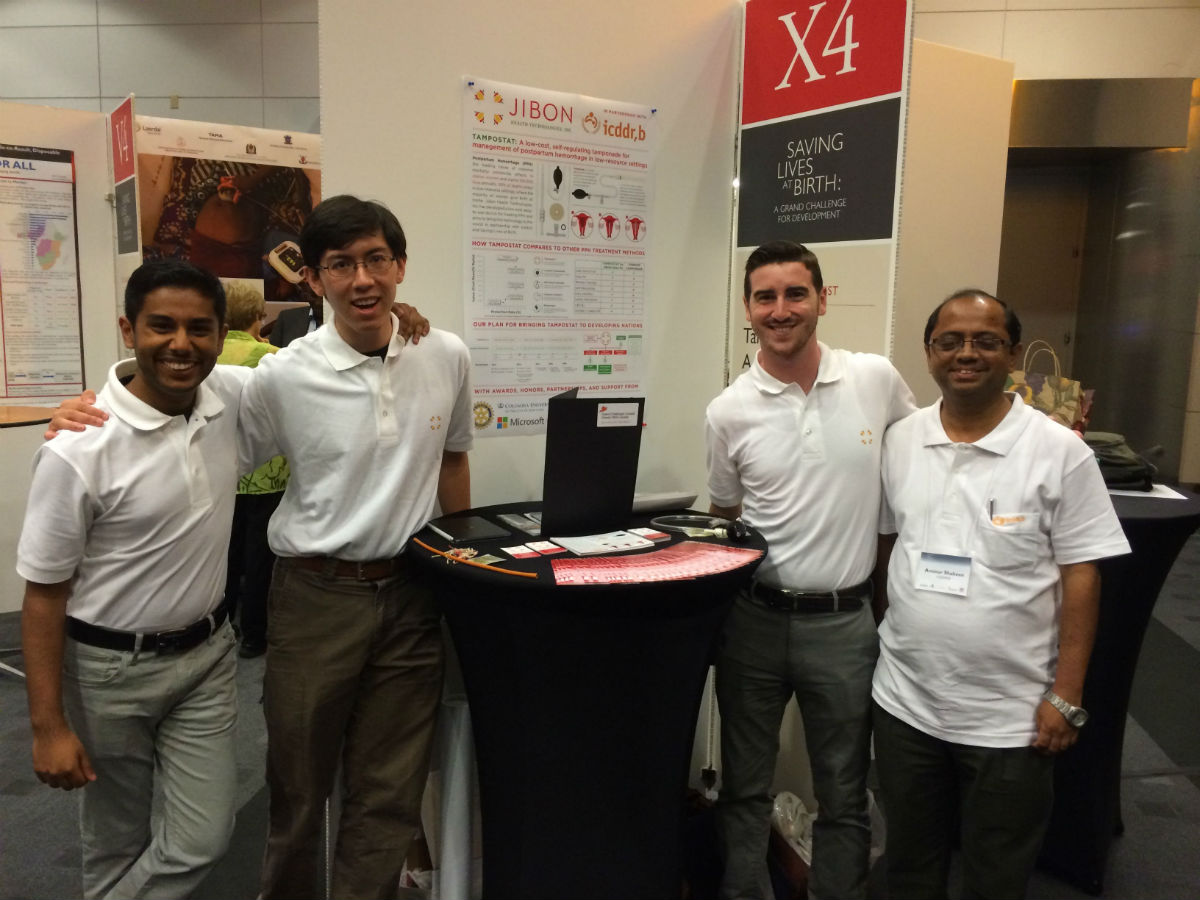Touro Med Student Secures $250K Grant for Lifesaving Technology
First-Year Student Developed Technology That Could Save Thousands of Postnatal Women

New York, N.Y. – Mikail Kamal, a first-year medical student at Touro College of Osteopathic Medicine (TouroCOM), has secured a $250,000 grant to further develop a breakthrough emergency healthcare device he has created that has the potential to save the lives of hundreds of thousands of postnatal women worldwide every year.
The apparatus, called Tampostat, is designed to manage post-partum hemorrhaging (PPH) -- excessive bleeding after childbirth -- which affects over 14 million women worldwide annually. According to the World Health Organization, PPH is the leading cause of maternal mortality in developing countries, accounting for more than 30 percent of all maternal deaths in Africa and Asia.
The award was presented on Aug. 1 to Kamal's and his research team at Jibon Health Technologies Inc.−a company that he cofounded− and Jibon’s partner organization in Bangladesh, the International Centre for Diarrheal Disease Research (ICDDR,B).
The grant was provided by the health advocacy organization Saving Lives at Birth (SLAB), which includes among its donors the Bill & Melinda Gates Foundation, and was presented after Kamal exhibited his invention at a recent conference in Washington, D.C.
“We were still dumbfounded on Sunday morning, when it hit us that we had actually won,” a grateful Kamal said.
“Touro students demonstrate academic excellence and drive. It’s wonderful when their achievements are recognized, particularly when such recognition will address a health crisis that leads to so many tragic consequences,” said Touro President and CEO Dr. Alan Kadish. “Mikhail, like so many of our students, is combining ingenuity, practicality and purpose in a way that can make us all proud.”
Kamal was among only 26 applicants to receive individual seed grants of $250,000 from SLAB, out of over 2,000 applicants from around the world. The funding will allow his team to complete clinical trials over the next two years, after which Jibon plans to distribute the device on a national and international level. He said healthcare advocates in developing nations such as Somalia and Tanzania have already expressed enthusiasm for Tampostat, which currently has a patent pending.
“Students at the Touro College of Osteopathic Medicine are committed to the study and reduction of health care disparities. They have made medical missions throughout the world,” said Dean Robert Goldberg, DO. “Mr. Kamal has taken the next step. Through this invention, childbirth safety will improve for the millions of women who give birth at home.”
Kamal said he began work on Tampostat as a research project while studying for his degree in biomedical engineering at Columbia University. He said he was inspired by the memory of an aunt who died from PPH in his native country of Bangladesh.
“Having grown up in Bangladesh, I witnessed the suffering that many faced due to the lack of access to healthcare facilities,” he said, adding in Bangladesh, more than 80 percent of women give birth at home with the help of community midwives. If and when complications do arise, mothers have to be transported to clinics that often are several hours away, he said, adding that current PPH treatments can only be administered by higher-level health workers in a hospital setting.
M. Mustafizur Rahman, deputy permanent representative of Bangladesh tothe United Nations for Bangladesh, said he was optimistic about Kamal’s potentially lifesaving apparatus for use in developing countries, “where the rate is still high for PPH in pregnancy and where modern medical facilities have yet to be made available. This is a simple device which you can teach to those who do not necessarily have to be obstetricians,” Mr. Rahman said.
Tampostat is an intrauterine device that uses a male condom as a medical balloon to apply air pressure to the uterus to reduce or stop uterine bleeding. Other, saline-based devices exist; however, Kamal said, “they require a lot of technology know-how.” Tampostat is marketed as easy-to-use, and costs around $1.50 per kit, he said.
“The new apparatus will keep the process simple and safe enough for at-home caregivers to administer,” Kamal said. “While we spend vast resources on advanced medical technologies for use in hospital settings, we often forget about simple technologies than can be used to save lives in the field.”
Born from a long line of physicians, Kamal underwent cancer treatment at the age of eight in Singapore. After his family settled in New York, he attended Stuyvesant High School where he excelled in math and continued his studies in mathematics and biology at Fordham University.
Later, Kamal said he found his true calling by combining math and biology through the biomedical engineering program at Columbia. There, he said, he found “a huge correlation between medicine and engineering. They go hand-in-hand. I was also inspired by the patient care aspect of it. I wanted to be the person who not only makes the equipment, but who sees the whole thing through.”
Kamal said he enrolled at TouroCOM because of its highly-rated osteopathic program and because it is located in New York City. As a cancer survivor, he said he embraces what he sees as osteopathic medicine’s therapies that treat the patient as a whole, through study and interdependence of the biological, clinical, behavioral, and social sciences.
With Kamal at the helm Jibon has won several awards and competitions for innovation and entrepreneurship, and is poised “to solve global health problems through creative engineering,” as their website advertises.
“I believe that healthcare is an international thing,” Kamal says. “People talk about community, community, community. But healthcare concerns are global, and we should reach out everywhere.”

